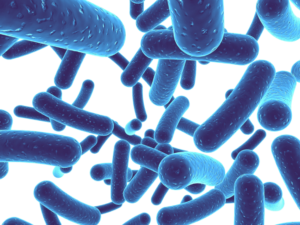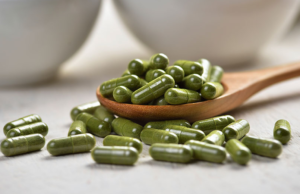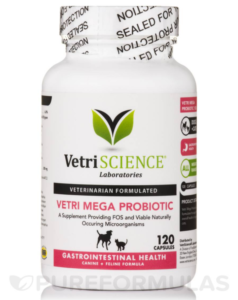Health Benefits Of Probiotics For Your Dog Explained
Table of Contents
If you’ve ever eaten Yogurt, Kefir or Sauerkraut, then there’s a good chance that you’ve encountered probiotics already. The word ‘probiotic’ has it’s origin in ancient Greece and can be directly translated as ‘for life’ – which is exactly what you want to be associated with the food you eat.
If your dog is suffering from general illness, excessive shedding or a bad case of diarrhea, it’s probably because they are suffering from a lack of probiotics. When your bodies probiotic count is lowered, your immune system is weakened and ultimately you become more vulnerable to illness and disease.
I think a lot of people tend to forget, or don’t really have a firm understanding of how much effort and responsibility goes into taking care of a dog. Ensuring that they lead a healthy life, making sure that they get enough variation in their diet and that they’re clean and well-exercised all takes time and effort.
However, there are a few simple rules that you can follow to help make the job a little easier, keep your pet in tip-top health, and save you a small fortune in medication, treatments and visits to vet which can all accumulate over time.
What are Probiotics?

probiotics are tiny, living microorganisms that are considered ‘friendly bacteria’

probiotics are tiny, living microorganisms that are considered ‘friendly bacteria’
In essence, probiotics are tiny, living microorganisms that are considered ‘friendly bacteria’ which our body needs to stay healthy – so long as we have a balanced amount of them in our body. Most bacteria form and exist in our gastrointestinal system and if there is an uneven ratio of bad to good bacteria in our body, we tend to fall ill.
The results of illness caused by an imbalance of bacteria can form in a variety of ways, both internally and externally. We can often only diagnose the issue once these symptoms become more developed. This applies to both humans and dogs.
Essentially, probiotics work to keep our intestinal tract healthy and clean by preventing the spread and growth of negative bacteria such as E.coli and Salmonella amongst others. They kill off these bacteria and allow our bodies to function properly without being weighed down by infection and disease.
Of course, all of this happens on a spectrum which means that you need a little of both the good and the bad bacteria in order to maintain a healthy and functioning gut. Too many probiotics could ironically lead to a weakened immune system, as well as other digestive-related issues such as kidney stones (in humans), high levels of uric acidity, bloatedness and gas as well as other infections. So as with everything in life, balance is key.
How Probiotics Can Help Your Dog

A high probiotic count allows your pet to keep its blood clear of toxins

A high probiotic count allows your pet to keep its blood clear of toxins
As I explained briefly in the previous paragraph, having a healthy probiotic count is important for maintaining a healthy dog. A good probiotic count will increase the strength and effectiveness of your dog’s immune system. However, probiotics also help with regards to food digestion and decreasing your dog’s susceptibility to food allergies.
A high probiotic count also allows your pet to keep its blood clear of toxins and waste which allows them to carry more oxygen and nutrients throughout their body. This can help to reduce excessive shedding, improve their skin and coat, regulate bowel function and reduce the chances of contracting infection such as rashes, candida and yeast infections.
Overall, maintaining your dog’s probiotic count can save you a great deal of money in the future with regards to costly medications and visits to the vet – so don’t overlook their importance.
How to Tell if Your Dog Needs More Probiotics

Itchy and irritable skin is one way to tell that your dog is suffering from a lack of probiotics

Itchy and irritable skin is one way to tell that your dog is suffering from a lack of probiotics
Unfortunately the only way to tell that your dog is suffering from a lack of probiotics is once the symptoms manifest themselves. This is usually in the form of a bacterial infection that can show up topically – excessive shedding, itchy and irritable skin and rashes, or they can be in the form of bowel irritations such as vomiting, diarrhea or constipation.
However, ensuring that your dog has a balanced diet is one of the easiest ways to make sure that they get enough natural probiotics. This will prevent these issues from happening in the first place. Though, once your dog becomes infected, you may use a probiotic supplement to balance out the bacteria in their gut and ultimately treat these issues quite effectively.
It’s always important that you consult a veterinarian before putting your dog on any form of medication or supplements, as there are a lot of variables to consider when using these treatments. Using too much could result in a variety of other health issues such as infections or topical skin related issues.
There’s also the risk of conflicting medications. If your pet is on a certain type of medication already, using an antibiotic supplement could have a negative impact on your pet’s immune system and overall health. So it’s always better to be safe rather than sorry.
Which Probiotics Are Safe to Add to Your Dog’s Diet

VetriScience Vetri Mega Probiotic

VetriScience Vetri Mega Probiotic
This is something I spent quite some time trying to figure out. Ensuring that you use the correct products or treatments in the right dosages is very important, lest you cause any further health complications in your pet.
There are a number of ways in which you can introduce probiotics into your dog’s diet on a regular basis that are both easy and effective. I’ve found however, that the following two options work best. They’re cost effective and won’t affect your dog’s eating habits too much.
The first and most common method is to introduce a probiotic supplement to your dog’s diet. These can be in either pill or powder form and can be added to your pets food or simply administered orally much in the same way we would take any pill or vitamin supplement ourselves. These are very effective and generally last a long time, so long as they’re stored in the correct conditions.
I would highly recommend NWC Naturals Total-Biotics, which comes in the form of a powder. I also recommend the VetriScience Vetri Mega Probiotic as they’re widely regarded as one of the best on the market. The other option for increasing your pet’s probiotic count without spending as much money on probiotic supplements is to include fermented vegetables (leftovers from your own meals) into your pet’s diet on a bi-weekly basis.
When vegetables ferment, they produce similar bacteria to the ones found in your gut. When they’re ingested, these bacteria act as probiotics in your pet’s system and will help to neutralize the effects of harmful or negative bacteria. However, if your pet is not used to eating vegetables, it could be easier to start them off with a supplement at first, and slowly work the veggies into their diet.
Before and After Results of Probiotics For My Dog

I immediately noticed a difference after the first week of using the supplement

I immediately noticed a difference after the first week of using the supplement
The effects of probiotics may not be noticeable immediately, however after 2 weeks of regular use, most symptoms of disease or infection will either be alleviated or disappear altogether. Increasing your dog’s probiotic count is the best way to treat infections and disease without the risk of using potentially harmful chemical medications.
The same goes for us as humans; many of the probiotics used in treating your dog can even be used on yourself. I started using probiotics on my pet a year ago when I noticed that she was shedding excessively. My vet determined that she was suffering from food allergies because of a cheap canned food product I was serving her. I immediately switched to a better brand of food and started giving her a regular dose of probiotic supplement (in this case NWC Naturals Total-Biotics) twice daily for a week and then 3 times a week. Now, I give her probiotics on a bi-weekly basis (unless she falls ill, then I increase the dose and rate).
With regards to the shedding, I immediately noticed a difference after the first week of using the supplement. After a month, the problem had basically disappeared. I also washed her once a week at that point, which may be a bit drastic, but I didn’t use shampoo – just a rinse and gave her a brush afterwards to collect any hair that had come loose.
Using this method of treatment definitely worked for me, and I would recommend it as the first option in treating disease or infection in your dog, before considering conventional chemical-based treatments.
DYK: Probiotics work to maintain your dog's healthy skin and coat? Dump that itch and get his gut right!#DogSupplements #Fidobiotics #Dogs pic.twitter.com/nAPraWiTJx
— Fidobiotics (@Fidobiotics) July 19, 2017
Conclusion
Probiotics are a purely natural function of everyday life – so it’s not as though you’re introducing something alien into your body when you take them – even though they are bacteria.
It’s a much healthier and more natural approach to treating common diseases and infections and will increase your dog’s overall health without the risk of exposing your dog to the side-effects that generally come with conventional treatments.
Probiotic supplements or naturally occurring probiotic treatments such as fermented vegetables, are also a lot cheaper than most of the medicines available on the market today and they can save you a ton of cash in the long-run in terms of making visits to the vet. The results will speak for themselves as will the smile in your pooch’s eyes.
https://youtu.be/TWukdnuEuP0
No comments yet.